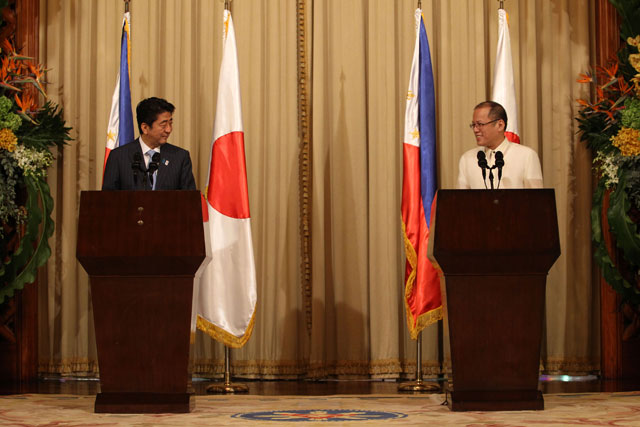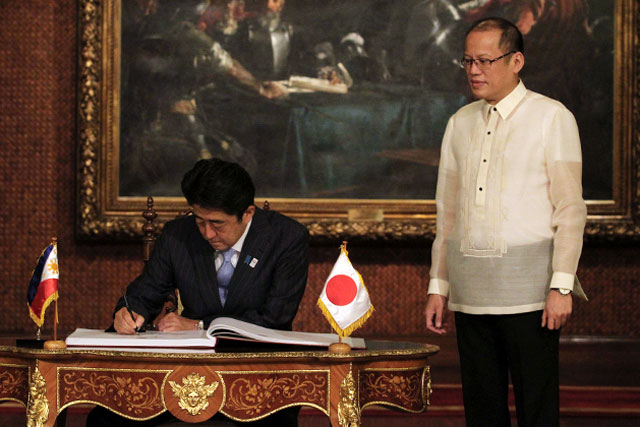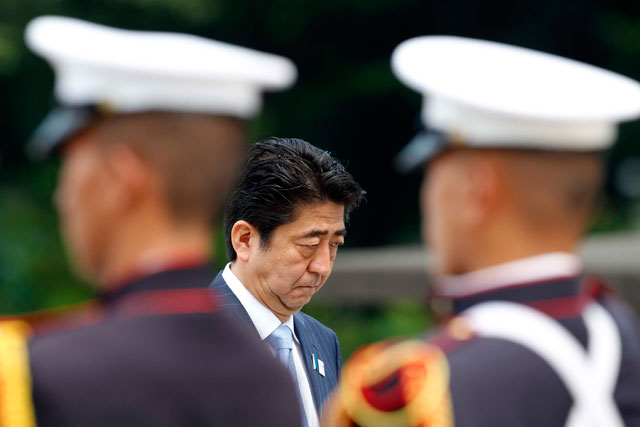SUMMARY
This is AI generated summarization, which may have errors. For context, always refer to the full article.

MANILA, Philippines – In a visit seen as an “image-building” move against an aggressive Beijing, Japanese Prime Minister Shinzo Abe on Saturday, July 27, vowed to boost the Philippines’ maritime security and extend other forms of aid.
In a meeting with Philippine President Benigno Aquino III on Saturday morning, Abe pledged 4 forms of assistance to the Philippines that included improving the capabilities of the Philippine Coast Guard.
“Both countries share a strategic interest of making the Asia-Pacific region a free and open region, not by coercion or intimidation, but by the rule of law,” Abe said in a press conference in the afternoon.
Abe spoke in the context of territorial disputes involving China, the rising superpower. Japan is embroiled in a territorial dispute with China over the East China Sea, while the Philippines has engaged in a new word war with China over the West Philippine Sea (South China Sea).
(Watch parts of Abe’s press conference below.)
‘Kampi-kampihan’
Japanese studies expert Lydia Yu-Jose, however, criticized the “strategic partnership” that was the bigger picture behind Abe’s visit.
The strategic partnership, which was forged in September 2011, involves boosting maritime security amid territorial disputes.
Before this, Jose depicted the two countries’ bilateral relations as an “exchange of goods, people, ideas.”
“We never had any sort of a military relationship,” she pointed out.
Given the strategic partnership, Japan, for instance, has committed to donate US$11-million patrol boats to the Philippines.
In an interview with Rappler, Jose dismissed this partnership as a symbolic “image-building” move.
“It’s a step in the hope that China will wake up and be afraid. I don’t think it’s a good strategy. I don’t think they will scare China. I think they will only provoke China,” Jose.
Jose, a political science professor, said she frowns upon this because the two countries “seem to be ganging up against an opponent, an enemy.” She said, “Parang kampi-kampihan eh.” (It’s like taking sides.)

Biggest donor but…
Besides, she said, maritime aid from Japan could take its toll on other forms of assistance.
Jose referred to the development aid that the Philippines receives from Japan. In 2012, Japan was the Philippines’ biggest source of Official Development Assistance (ODA) commitments, after it contributed 34% of the total.
If Japan spends on patrol boats for the Philippines, Jose said the slices in the ODA “pie” will “just become small so that it can have a slice for those patrol boats.”
“That means it will have to deduct some money, let’s say, for humanitarian aid, education, infrastructure,” she explained.
The best way forward, according to Jose, is to “try to engage” China.
Deterring aggressors
In a Thought Leaders piece for Rappler, another analyst said the strategic partnership will not necessarily help in protecting territorial claims.
“Instead, as its cooperation with Japan indicates, Manila is primarily looking for a reaffirmation of its position that regional order in Northeast and Southeast Asia should not be at the mercy of unilateral action, but must be a product of intense consultations that addresses the insecurities of all countries in the region,” said Julio Amador III, an Asia Studies visiting fellow at the East-West Center in Washington.

Despite this, Amador said, the Philippines’ strategic partnerships with Japan and other countries “have already contributed to the Philippines’ defense posture.”
“The Philippines has already gained a significant commitment from Japan to improve its surveillance capacity. Further, strategic partnerships provide a stronger avenue for defense and security cooperation. Aside from the material benefits, they can theoretically provide an indirect deterrence function by involving other states that future aggressors may not want to provoke,” Amador said.
Abe’s two-day visit was the first by a Japanese prime minister since 2006. It was Abe’s 3rd visit to a Southeast Asian country this year “to further enhance our bilateral relationships,” said Japan’s Chief Cabinet Secretary Yoshihide Suga. – Rappler.com
Add a comment
How does this make you feel?
There are no comments yet. Add your comment to start the conversation.